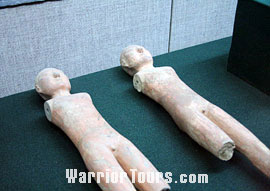Western Han
 Western Han Dynasty, also named the Former Han Dynasty, was established by Emperor Gaozu - Liu Bang in 202 BC, with Chang'an (Xian today) as its capital city. Historians calculate that the Western Han Dynasty began in 206 BC. Following the Qin Dynasty (221 BC - 206 BC), Liu Bang made himself king. It was the first powerful and stable dynasty in Chinese history. From beginning to end, Western Han experienced 200 years' history, having 12 emperors.
Western Han Dynasty, also named the Former Han Dynasty, was established by Emperor Gaozu - Liu Bang in 202 BC, with Chang'an (Xian today) as its capital city. Historians calculate that the Western Han Dynasty began in 206 BC. Following the Qin Dynasty (221 BC - 206 BC), Liu Bang made himself king. It was the first powerful and stable dynasty in Chinese history. From beginning to end, Western Han experienced 200 years' history, having 12 emperors.
After ascending to the throne, Liu Bang drew a lesson from the destruction of the Qin Dynasty and adopted a rehabilitation policy. In agriculture he encouraged production, reduced conscript labor and cut many taxes. In politics, he initially conferred noble titles and kingdoms on meritorious ministers and generals only to abolish their titles and execute them once the regime had been stabilized. Because of long-term wars, the nation was weak, and Lu Bang was besieged in Baideng (northeast of Datong City, Shanxi Province today) when he led his army to attack the Huns. Thereafter, the Han Dynasty adopted the 'Peace-making Marriage' policy to pacify the invasion of the Huns.
After Liu Bang's death, Emperor Huidi, Liu Ying inherited the throne. However, the helm of the country was actually in the hands of Empress Lv. She made Cao Can prime minister, and continued to carry out Liu Bang's sovereign policies. Social economy and politics continued to advance. Meanwhile, Empress Lv appointed her relatives to suppress those meritorious ministers, which resulted in a revolt. The empress was killed during the chaos.
Once the revolt was suppressed, Liu Qi, Emperor Wendi, was made emperor by the ministers. Liu Qi and his son Emperor Jingdi continued to carry out Liu Bang's policy. Through their efforts, Han Dynasty resumed its rise once again. During their rule, society was stable; the economy prospered; the people lived happy and peaceful lives. The period of their rule was therefore named 'enlightened administration of the Wen-Ching period'.
After Emperor Jingdi, his son Liu Che, Emperor Wudi took over the throne. With his enterprising spirit, he adopted a series of reforms in politics, culture, military and diplomacy, which made Han Dynasty more powerful. In politics, he carried out 'Tui En Ling', which was a policy to weaken the power of feudal lords and to strengthen state power. He took Dong Zhongshu's advice to govern the country actively, paying supreme tribute to Confucianism and neglecting other schools of thought. Militarily, he assigned Generals Wei Qing and Huo Qubing to attack the Huns, and win. Then, he annexed Nanyue State and conquered North Korea, which made China dominant in East Asia. In diplomacy, he sent Zhang Qian to the Western Regions (the middle and west Asia and the Indian peninsula areas today) as an envoy twice, and opened up the world-famous Silk Road. However, Emperor Wudi always craved greatness and success, so there were many wars in his reign. Recognizing the serious internal economic situation in his later years, Emperor Wudi nationalized the production of currency, iron casting and salt making, strengthened agriculture production, dug the Baiqu Canal and stabilized prices of daily goods. By doing so, he attempted to rescue the economy of Western Han, and his measures did take some effect.
After Empeor Wudi's death, his eight-year-old son, Liu Foling inherited the throne, becoming Emperor Zhaodi. In the early years of Emperor Zhaodi, he was assisted by Shangguan Jie, Jinri Dan and Huo Guang. Later, a coup happened, during which Shangguan Jie was killed. Thereafter, Huo Guang controlled power with his own hands. Huo Guang continued to carry out Emperor Wudi's policies to rehabilitate the social economy. A supporter of the later Emperor Wudi, Liu He, was a dissolute person. He planned to kill Huo Guang, but was dethroned by Huo Guang before he had a chance. Then, Huo Guang made Liu Bingji Emperor Xuandi.
After Huo Guang's death, Emperor Xuandi continued to adopt Huo Guang's statecraft. He shook up the Bureaucracy, acted against corrupt officials, persuaded people to farm, restrained annexation, and reduced the state's power in the social economy. Through the rehabilitation policies of Emperor Zhaodi and Xuandi, Western Han Dynasty's economic and national forces were recovered.
After Emperor Xuandi's death, Emperor Yuandi came to the throne, and Western Han gradually declined. Emperor Yuandi was delicate and too kind, which made the emperor's power fall into the hands of the eunuchs and his relatives on the side of the empress. Following him, Emperor Chengdi was addicted to wine and women, so state affairs fell into disorder. Then, from emperor Aidi to Empeor Ruzi, the eunuchs and emperor's relatives on the side of the empress and queen dowager grew stronger. Finally, Wang Mang, Empress Dowager Wang Zhengjun's brother, forced Emperor Ruzi to abdicate, and established the Xin Dynasty. Western Han ended.
As one of the peaks of ancient Chinese history, Western Han Dynasty experienced a period of all-round development in social politics, economy, science, culture, and foreign exchange. Besides the above progress, Western Han also made great achievements in culture and science. In culture, the famous books Shi Ji, Zhou Bi Suan Jing, and Jiu Zhang Suan Shu were all produced at that time. In science, Emperor Wudi ordered the establishment of a new calendar - Taichu Calendar, based on the old calendar. Since then, China had a formal way to count and record the years.

